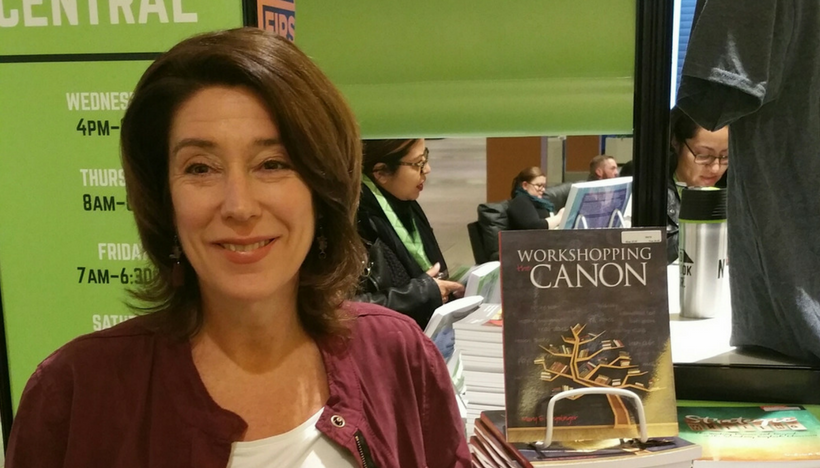This post is written by member Mary Styslinger.
Do you sometimes feel torn between teaching literature and literacy? On the one hand, I love literature. It is one of the reasons I became an English teacher. I want to inspire others to love Macbeth, The Canterbury Tales, and Animal Farm as much as I do. On the other hand, I am also passionate about literacy. I want to inspire a generation of lifelong readers and recognize that not every student is going to be excited by a Scottish thane’s obsession for power, a knight’s pilgrimage to Canterbury, or a bunch of talking pigs. Many of us struggle with the readability and relatability of the classical literary works school districts and national standards often expect us to teach. We know each reader’s interests, strengths, and challenges are unique, and no single text is appropriate for every student.
So should we teach canonical works or not? There are those of us who keep trying, and there are those of us who jump at the chance to teach other texts, including young adult novels, nonfiction works, graphic novels, short stories, picture books, poetry, music, movies, and art. And there are those of us who bounce back and forth, teaching a classic novel, followed by a young adult novel, an essay squeezed in between, feeling a bit schizophrenic in our efforts to satisfy the expectations of districts, standards, parents, students, and self.
No matter your position, if we want students to read more often and subsequently improve their reading proficiency, then we need to provide high-interest and more accessible texts. We need to better incorporate what students are more likely to read out of school into the school curriculum. We need to surround students with all kinds of relatable genres.
It has taken me over 25 years of teaching, a whole lot of reading and listening, not to mention a bunch of teacher trial-and-error, to figure out a way to interweave literature with literacy. I write about this process in Workshopping the Canon. In this book, “workshop” is used as a verb (i.e., to workshop) because it involves action on the part of teachers. When we workshop the canon, we actively and purposefully partner classical texts with a variety of high-interest texts from multiple genres within a reading and writing workshop structure, aligning the teaching of literature with what we have come to recognize as best practices in the teaching of literacy.
When we workshop the canon, we immerse students in a wide assortment of texts, providing multiple viewpoints and an array of representations gathered around a unit focus. Workshopping teachers bring together classic texts and contemporary texts; fiction texts and nonfiction texts; and especially a wide array of texts representing a range of world literatures, historical traditions, and genres and texts representing the experiences of different genders, ethnicities, and social classes.
When we “workshop the canon,” we can still teach 1984, but we do so within a unit focused around an idea such as freedom of speech and expression. We then explore the unit focus through a variety of reading workshop structures, including read-aloud, independent reading, shared reading, close reading, readers theatre, response engagements, Socratic circles, book clubs, and mini-lessons; and writing workshop structures, including mentor texts, writing plans, mini-lessons , independent writing, conferences, writing circles, and publishing opportunities. I explain each of these structures in the book. If we workshop the canon, we can be both a teacher of literacy and a teacher of literature. One does not have to preclude the other.
When we workshop the canon, we can better reach diverse learners and foster diverse perspectives. When we teach one text at a time, we limit points of view. So much of English language arts education is departmentalized and compartmentalized: literature is detached from literacy, reading is separate from writing, and grammar is disconnected from both. We break apart genres like crackers and study poetry, memoir, short stories, then plays. Classical literary works are split from young adult novels. We have also been known to celebrate, albeit isolate, works by women, African American, Latinx, Native American, and Asian authors. Time periods and literary movements further sever texts into smaller groups. But when we workshop the canon, we increase cultural perspectives through students’ multiple and varied engagements with texts and each other.
When we workshop the canon, we can better meet the diverse needs of students because workshop structures and strategies are accessible to all learners. We can better differentiate learning and meet individual needs in a reading and writing workshop environment. It only makes sense. If there are more texts, there are more choices. Students can make guided selections for independent reading across levels and languages, whereas the reading of a core canonical text is supported and shared.
My hope in writing Workshopping the Canon is to provide middle and high school English teachers with ideas for workshopping their own classrooms and curriculum. The teachers who write alongside me detail their classroom experiences to encourage colleagues. While this book does provide specific suggestions for workshopping certain canonical texts, the ideas are shared to prompt independent, creative, and critical thinking. The suggestions offered are not meant to be prescriptive; they are descriptive. This book endeavors to make the often invisible and always messy processes of workshop planning visible. It is written to show teachers a way to teach reading, writing, language, speaking, and listening using familiar classical texts. It is a book to help bridge the divide between literature and literacy. It is a book for those teachers wanting to workshop. It is a book to help you through the process.
Mary Styslinger is an Associate Professor of English and Literacy Education at the University of South Carolina. She is a past president of the South Carolina Council of Teachers of English and co-edits the South Carolina English Teacher. Her new book, Workshopping the Canon, has just been published by NCTE.

